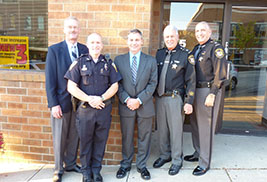 Knowing the right question to ask when faced with a person who is in a mental health crisis has earned 5XÉçÇř Police Services Officer Will Scritchfield of Uniontown, Ohio, the 2013 Crisis Intervention Team (CIT) Officer of the Year Award in Portage County.
Knowing the right question to ask when faced with a person who is in a mental health crisis has earned 5XÉçÇř Police Services Officer Will Scritchfield of Uniontown, Ohio, the 2013 Crisis Intervention Team (CIT) Officer of the Year Award in Portage County.
“At Kent State, some students are under a lot of pressure to succeed. They are placed in this new environment, often on their own, for the first time in their lives. It can be very stressful if things don't go just right,” Scritchfield explains. “CIT training allows me to better communicate with students who may get to a crisis stage. It also is helpful in dealing with people in the community who may suffer from a mental illness. Understanding the basics of the right questions to ask has been valuable in these situations.”
Scritchfield’s approach to his job extends to nonstudents when it comes to working in a diverse setting like a university.
The Crisis Intervention Team training is sponsored in Portage County by the Mental Health and Recovery Board in partnership with the Portage County Sheriff’s Office. More than 200 law enforcement professionals representing all the local police departments in the county, as well as the sheriff’s office, have been trained through the program.
The program was created by the National Alliance on Mental Illness to provide officers with the knowledge and tools to help de-escalate people in crisis and make referrals. The end results are safety for the indi¬vidual and the officer and the probability that the person will be connected to the services he or she needs.
Kent State Assistant Police Chief Dean Tondiglia nominated Scritchfield for his extraordinary follow-through with students and others that the officer has come in contact with during the last year.
“Many times, Officer Scritchfield worked hard to unite those in crisis with the proper community resources and would follow up to make certain the person was getting the care they needed. He did this with the utmost compassion and dignity for the person,” Tondiglia wrote in the nomination.
Tondiglia says Scritchfield has had numerous cases this year where he has served as the point-person to bring together faculty, University Health Services and the community-based Coleman Professional Services mental health agency to help a student in crisis. His dialogue with the student and networking with the services meant the student was referred for help rather than an arrest. Coleman is an agency that receives funding from the Mental Health and Recovery Board to provide services in Portage County.
Scritchfield also helped an elderly woman who was driving without a license on campus and who appeared to be extremely confused and in distress. Officer Scritchfield took the time to contact her neighbors and adult protective services to initiate care for her.
“I believe it’s important for every officer to understand that each person has their own threshold of what a crisis is to them and although we may not understand it from their perspective, to that person it is very real. CIT training helps officers understand this and gives them some tools to help people during these times,” Scritchfield says.
Scritchfield joined Kent State Police Services in 2008. He previously worked for the Uniontown Police Department and as a construction manager for Schumacher Homes. He graduated with honors from The University of Akron where he earned a degree in criminal justice and also went through the police academy.
When the housing downturn hit the construction business, he decided to pursue his passion and train to be a police officer.
“I have always had a lot of respect for those who serve in the military and in local law enforcement,” he says.
Scritchfield shares the 2013 Officer of the Year Award with Lt. Sharon Hissom of the Robinson Memorial Hospital Police Department. They are the seventh and eighth officers to receive the recognition.
Scritchfield is the third officer from Kent State Police Services to earn the Officer of the Year distinction. Officer Michquel Penn was honored in 2009, and Officer Jeff Futo in 2010.
The Mental Health and Recovery Board of Portage County is a county agency that plans, funds and monitors public mental health and addiction treatment services for Portage County residents. Mostly funded by local levies, the board also funds 24-hour emergency services to help residents in crisis and to provide assistance when communities experience crisis incidents. Services are funded through a network of community agencies: Coleman Professional Services, Townhall II, Children’s Advantage and Family and Community Services.
For more information about Kent State Police Services, visit www.kent.edu/police.
